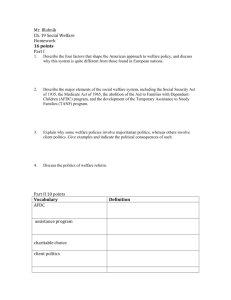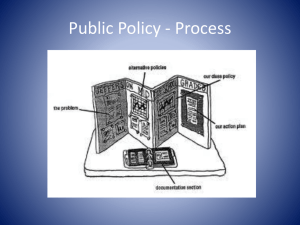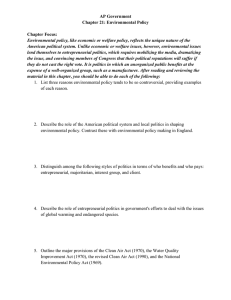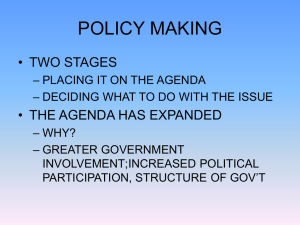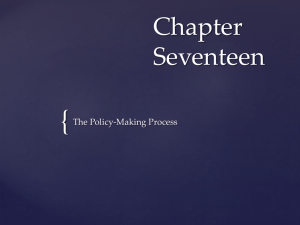Policy Making
advertisement
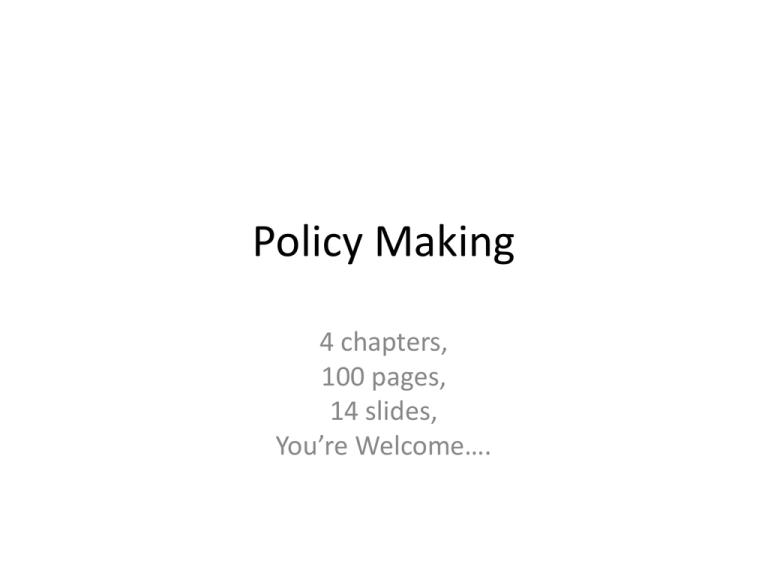
Policy Making 4 chapters, 100 pages, 14 slides, You’re Welcome…. Setting The Agenda The Political Agenda: “What are we going to make policy about?” What are legitimate issues to put on the agenda? Based on: • Shared political values • Custom and tradition • Impact of events Scope of Government Action • What is legitimate? –Always gets larger • General belief that government should continue to do what “it always” has done • Events change our perception What Prompts Change? • Groups – Organized or disorganized – “Relative deprivation”: Worse than you expect – Can change values and beliefs of others • Institutions – Courts – Bureaucracy – Senate • Media – Power of Agenda Setting (Gatekeeper) • The States Decision Making • Now that something is on the agenda how is the decision made? – Determined by nature of the issue • Impacts groups that become politically active • Affects intensity of conflict • Best viewed through Cost/Benefit Analysis – Cost: Any burden that people must bear (or expect to bear) from the policy – Benefit: Any satisfaction that people must receive (or expect to receive) from the policy – Viewed through perception and legitimacy (should that group benefit?) Types of Politics • Majoritarian Politics – Distributed Benefits (large numbers) – Distributed Costs (large numbers) – Appeals to large group of voters – Examples • Military • “Obamacare” Types of Politics • Interest Group Politics –Concentrated benefits (small number) –Concentrated costs (small numbers) –Debate between interest groups with minimal public involvement –Example • Labor Unions v. Businesses Types of Politics • Client Politics – Concentrated Benefits (small numbers) – Distributed Costs (large numbers) – Called “client” politics because those that benefit are getting policies that serve their needs – Examples • Farm Subsidies • Welfare Types of Politics • Entrepreneurial Politics – Distributed Benefits (large numbers) – Concentrated Costs (small numbers) – Success dependent on… • A policy entepreneur who works on behalf of unorganized majority OR • Large number of voters or legislators become frustrated with another’s benefits – Examples • Seat belts in all cars • Superfund for environmental clean up Types of Politics Distributed Benefits Concentrated Benefits Distributed Costs Majoritarian Client Concentrated Costs Entrepreneurial Interest Group Social Welfare in the United States • Four Factors make us unique – Restrictive view on who is entitled to government assistance – Slower than other nations to embrace welfare – Large role for states and private institutions – Nongovernmental agencies play a role Two Kinds of Social Welfare • Majoritarian – Social Security – Medicare • Client Politics – Medicaid – Food Stamps – “Means Tested” – Legitimacy Social Welfare • Entitlements – Programs that legally guarantee benefits to people who meet certain criteria – Examples • Social Security • Medicare • Medicaid • Issue – Hard to reform because benefits are “guaranteed” yet make up over 40% of federal budget (impacts budget process) War Powers Act • Provisions – President can commit troops to hostile situations but must report to Congress within 48 hours – Initial commitment is 60 days and Congress can extend (they always have)
